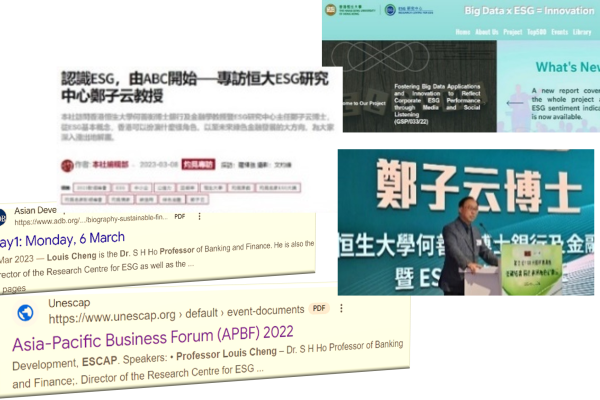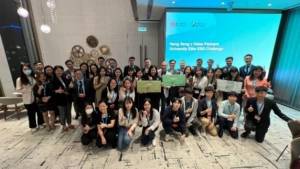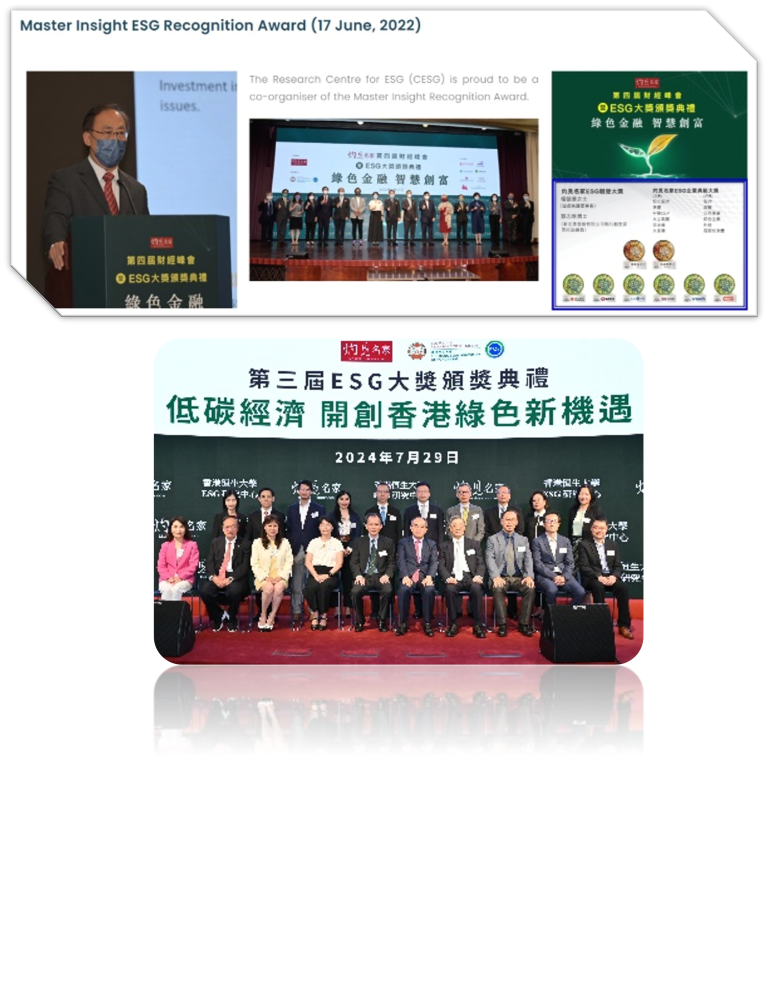Executive Summary
Prof. Louis Cheng began to explore ESG and green finance research in 2018. Through constantly engagement with the industry and the market, he identified an important industry need in ESG integration for asset management industry and listed firms in Hong Kong. Based on a 2019 working paper from the MIT team[1] on the ESG divergence, he began to develop the idea of i-score as an academic research issue while applying it in various industry engagement to create an impact for the professional community. In the story below, you can see how the i-score research journey and the industry engagement unfold.
[1] Berg, F., Kölbel, J., and Rigobon, R. (2019). Aggregate Confusion: The Divergence of ESG Ratings". Available at SSRN: https://ssrn.com/abstract=3438533 ; the paper published at Review of Finance (2022).

Research Theme Background
The term "ESG" (environmental, social and governance) first appeared in 2004, when the United Nations Global Compact (UNGC) promoted the idea of ESG integration in the investment decision process. In the past few years, ESG integration has become a main stream practice in the finance industry and the business sector in Hong Kong. At the same time, academic research began to pay attention on ESG measures and their effects on investments and firms' performance. This impact story describes how Prof. Louis Cheng engaged ESG-related academic research and knowledge transfer activities to benefit the business community.

Research Chronicle and Industry Engagement
Research impact in finance relevant to society normally does not begin with ideas purely created from academic literature. For impactful research in finance, often times we need to constantly engage with the industry and the market to observe what are the needs first. Then we match with the latest literature and explore how to construct meaning research hypotheses that can lead to academic publications relevant to these impactful topics. Therefore, the impactful activities can start with explorative industry and professional engagement while the academic research is being conducted simultaneously. In other words, the time sequence of "Publication first – Impact later" may not be as distinctive in the fast-moving areas such as finance and investments. However, the research must begin first to produce the initial findings/products for the societal impact. In the case below, the research journey and the industry engagement occur in an interactive manner.
Early Development
Prof. Louis Cheng started to explore ESG and green finance research when he took over the Directorship of Center for Economic Sustainability and Entrepreneurial Finance (CESEF) at PolyU in 2018. He published (co-authored) his first green bond paper (Broadstock and Cheng, 2019) in the Finance Research Letters (FRL) (Q1 ranking) and a green bond chapter in a book published by Routledge (Broadstock, Cheng, and Wang, 2020) in the next two years. In addition, another coauthored paper titled "The role of ESG performance during times of financial crisis: Evidence from Covid-19 in China" published at Finance Research Letters in 2021 is well-cited as it was one of the earliest ESG paper under the Covid setting. The paper was listed as number one "Top cited" and second in "Most downloaded" articles at FRL. In addition, as October 12, 2024, the paper received 1,305 downloads at SSRN and cited by 1,210 papers under Google Scholar[2].
At the same time, he received a PASS grant as the project leader from the Commerce and Economic Development Bureau to educate accounting professionals in Hong Kong on green finance and ESG for 2019-2021 (project sum $1.02 mil). This knowledge transfer project made a substantial impact to the accounting profession and business sector as it is one of the earliest government-funded training programs on ESG/green.
In short, the contribution of the academic research work and impact to society on ESG and green finance can be shown by publications, positive feedback from event participants, news media coverage, and creation of ESG award by Hong Kong Investor Relations Association. These positive signals have provided confirmation for Louis to engage ESG research when he moved to HSUHK.
[2] See https://www.sciencedirect.com/journal/finance-research-letters and https://scholar.google.com/citations?user=D89AgMQAAAAJ&hl=en
Developing a Research Focus on i-score and Related Society Engagement
Shortly after Louis continued his academic research and knowledge transfer activities on ESG, an important working paper from the MIT team[3] on the "aggregate confusion hypothesis" of ESG divergence emerged in 2019. The MIT paper has an interesting conclusion on the fact that various data and consulting agencies provide very different ESG performance rating for firms, leading to a confusion phenomenon among corporate executives. While there is a debate on the value of ESG divergence in academic research, the implication of divergence to management and executives is clear: they need better guidance and solution for understanding the ESG performance of their own firms because ESG divergence creates confusion to make business decisions. Therefore, after moving to HSUHK in early 2021, Louis applied for the RGC IDS grant to conduct more academic research on ESG divergence and aimed to provide solutions for businesses while publishing in academic journals. With the financial resources from the successful IDS grant (HKD 4.09mil), the i-score was formally tested with various sets of commercial ESG data. The aim of i-score is to reduce the confusion from ESG divergence and to provide a better indicator for Hong Kong listed firms.
[3] Berg, F., Kölbel, J., and Rigobon, R. (2019). Aggregate Confusion: The Divergence of ESG Ratings". Available at SSRN: https://ssrn.com/abstract=3438533 ; the paper published at Review of Finance (2022).
As publishing in academic journals takes a long time (normally 2 to 3 years from data analysis to paper acceptance by journals), Louis began to promote his i-score through public speeches and media interview (e.g., presentations to hedge fund (2021) and United Nations ESCAP (Dec 2021), keynote speech at ESG award (June 2022), and media interview (July 2022). In order to widen the societal impact of i-score, Louis applied for an Innovation and Technology Fund to conduct seminars and symposiums on using i-score and ESG sentiment under a big data analytical framework. The ITF grant was approved with a project sum of HKD 1.21mil for the 2023-24 period. These events with the dedicated website allow a better promotion of the i-score among the listed firms and asset management in Hong Kong.


Societal Impact
In June and December 2021, Louis and his team were invited to make presentations by a Hong Kong hedge fund, to demonstrate the usefulness of i-score for possible ESG integration for real investment portfolios for their clients. Confidential and proprietary data were used to track ESG performance of portfolio assets. The group Chief Investment Officer and fund manager were impressed with the outcomes and acknowledged the usefulness of the i-score ratings.

In 2022, Louis was approached by Hang Seng Investment Management Limited to consider organizing a university student ESG competition. The Hang Seng x Value Partners University Elite ESG Challenge 2023 was successfully launched in September 2022 and completed in March 2023. The ESG Challenge employs ESG research finding including i-score for the student training and final round case competition. The impact to society can be seen by 23 internship opportunities for students provided by well-known corporations and professional bodies, extremely positive feedbacks by industry executives and students involved in the Challenge, and the media coverage reporting the events.
On the other hand, Master Insight, an online news media, co-organized with the ESG Centre at HSUHK under the leadership of Louis to establish a scientific assessment framework based on i-score to evaluate ESG awardees. It is believed that this ESG award[4] earns the reputation of being the most difficult one among all awards in Hong Kong, promoting i-score as the industry norm for measuring ESG performance.
[4] Examples of media coverage about the award: "舉辦一個具公信力的ESG大獎 (2022-07-15)"

"2023財經峰會|16家企業、團體榮獲ESG大獎 G20綠色金融推手馬駿膺年度翹楚 (2023-06-12)" https://www.master-insight.com/2023%E8%B2%A1%E7%B6%93%E5%B3%B0%E6%9C%83%EF%BD%9C16%E5%AE%B6%E4%BC%81%E6%A5%AD%E3%80%81%E5%9C%98%E9%AB%94%E6%A6%AE%E7%8D%B2esg%E5%A4%A7%E7%8D%8E-g20%E7%B6%A0%E8%89%B2%E9%87%91%E8%9E%8D%E6%8E%A8/ and
"灼見名家x恒生大學第三屆ESG大獎港交所隆重舉行 陸恭蕙榮膺ESG翹楚 4人獲卓越領導獎 19家企業機構獲嘉" (2024-07-29) https://www.master-insight.com/%e7%81%bc%e8%a6%8b%e5%90%8d%e5%ae%b6x%e6%81%92%e7%94%9f%e5%a4%a7%e5%ad%b8%e7%ac%ac%e4%b8%89%e5%b1%86esg%e5%a4%a7%e7%8d%8e%e6%b8%af%e4%ba%a4%e6%89%80%e9%9a%86%e9%87%8d%e8%88%89%e8%a1%8c-%e9%99%b8/
Research Related to ESG and Green Finance
- Broadstock, D.C., and Louis T.W. Cheng. (2019). Time-varying relation between black and green bond price benchmarks: Macroeconomic determinants for the first decade. Finance Research Letters, vol. 29, pp.17-22. https://doi.org/10.1016/j.frl.2019.02.006
Broadstock, D.C., Cheng, L.T.W., and Wang, T. (2020) "Understanding Green Bond Challenges: A Stakeholder's Perspective." Green Finance, Sustainable Development and the Belt and Road Initiative, Routledge.
Cheng, L.T.W., Broadstock, D.C., Chan, K., and Wang, X. (2021). The role of ESG performance during times of financial crisis: Evidence from COVID-19 in China. Finance Research Letters, vol. 38, 101716. https://doi.org/10.1016/j.frl.2020.101716
Cheng, L.T.W., Broadstock, D.C., and Sharma, P. (2023). Interactive effects of brand reputation and ESG on green bond issues: A sustainable development perspective. Business Strategy and The Environment, pp. 570-586. https://doi.org/10.1002/bse.3161
Cheng, L.T.W., Lee, S.K., Li, S.K., and Tsang, C.K. (2023). Understanding Resource Deployment Efficiency for ESG and Financial Performance: a DEA Approach. Research in International Business and Finance, vol. 65. https://doi.org/10.1016/j.ribaf.2023.101941
Cheng, L.T.W., Shen, J., and Wojewodzki, M. (2023). A cross-country analysis of corporate carbon performance: An international investment perspective. Research in International Business and Finance, vol 64. https://doi.org/10.1016/j.ribaf.2023.101888
- Wojewodzki, M., Cheong, T.S., Shen, J., and Cheng, L.T.W. (2023). Does corporate carbon performance converge in the global market? Evidence from a distribution dynamic approach", Journal of Environmental Management, vol 342, 118355. https://doi.org/10.1016/j.jenvman.2023.118355
Research related to Divergence
Cheng, L.T.W., Cheong, T.S., Wojewodzki, M., and Chui, D. (2024). The effect of ESG divergence on the financial performance of Hong Kong-listed firms: an artificial neural network approach. Research in International Business and Finance, forthcoming.
- Cheng, L.T.W., Pan, L., Shen, J., and Yu, Q. Understanding ESG pillar divergence and the effect of international disclosure: Evidence from China during COVID-19 outbreak. Working paper.

